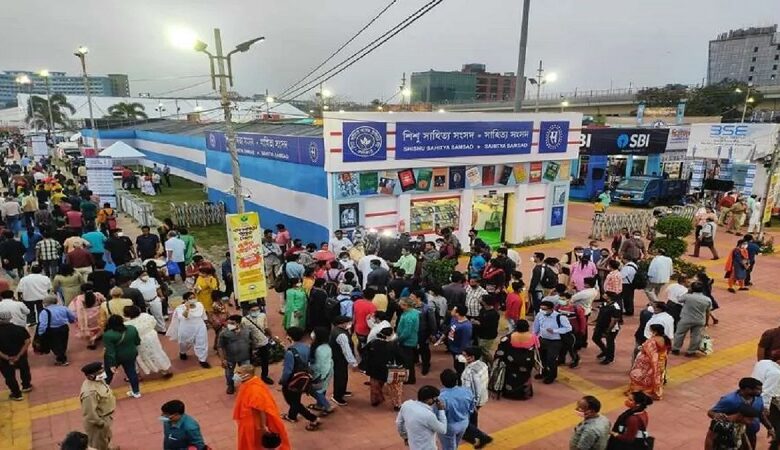Kolkata International Book Fair 2023

The Publishers and Booksellers Association was in charge of organizing the 46th International Kolkata Book Fair, which ran from January 31 to February 12. Boi Porun, Boi Kinun, Boi Upohaar Din (Read Books, Purchase Books, Gift Books) was the motto for the 13-day event, and the message appears to have been taken seriously by Kolkatans, who flocked to the event in large numbers. All prior records were shattered as more than 26 lakh people toured the location and more than 25 crore rupees worth of books were sold. These figures offer a lot of hope for the future of literature itself at a time when the one mandatory debate at all literary events is about not having enough readers.
The event, which was dubbed the largest book fair in Asia with over 900 stalls and the involvement of 20 nations, also featured a large number of booths selling food, handcrafted jewelry, paintings, posters, and other decorative items. Event planners placed a stunning Durga idol to mark UNESCO’s inclusion of “Durga Pujo in Kolkata” in the Representative List of the Intangible Cultural Heritage of Humanity, which was a big success among the visitors who crowded around to take pictures. All of the fair’s aisles were given names honoring notable authors, including Rabindranath Tagore, Jibanananda Das, Kavi Nazrul Islam, Nabanita Deb Sen, and Antonio Machado.
Spain was the main focus of the exhibition this year, and a section of Spanish books was on show. I was especially interested in the Spanish translation of Deepti Naval’s book A Country Called Childhood. There was a section devoted to assisting pupils who intended to study in Spain.
Many nations displayed books in their native tongues, and some, like the US, routinely organized events with their delegates holding sessions on addressing climate change. An enrollment drive was arranged by the British Council for their library. The Bangladesh hall, which was built to resemble a fortress, was bustling with booksellers and publishers selling works in a variety of genres, including translations, poetry, science fiction, romance, and nonfiction books about Sheikh Mujibur Rahman and their fight for independence. There were also meet-and-greet events with some well-known writers and authors from Bangladesh. I got a glimpse of the well-known Bangla author from Bangladesh named Sadat Hossain. Artists such as Anirban Bhattacharya, Monali Thakur, Abir Chatterjee, Ranjit Mallick, Anjan Dutt, Sudiptaa Chakraborty, Saurav Das, Anupam Roy, and many more attended the show in addition to literary figures.
Students from Sister Nivedita University, the event’s digital partner, recorded and produced content that was later uploaded online. They also dealt with the situation on the spot inside the SBI Auditorium, which hosted the Kolkata Literature Festival from February 9 to February 11. The governor of West Bengal, CV Ananda Bose, and the state’s education minister, Bratya Basu, officially opened the ninth iteration of KLF, which was taking place at the location. The three-day festival’s halls were packed with attendees for the numerous panel talks on the country’s literary scene, politics, and other current problems. Veteran writers like Shirshendu Mukhopadhyay, Amar Mitra, and Pabitra Sarkar discussed 75 years of independence as well as the unfathomable suffering caused by Partition and the recollections of the forced migrations that still reverberate throughout the continent.
Publisher and Editor David Davidar and Sujata Sen, Head of KLF, had a fascinating conversation about the evolution of Indian literature over the past 100 years. The future of literature from India that has been translated was also briefly addressed. In a conversation between author and policy expert Sanjaya Baru, Sumantra Bose, the translator of Krishna Bose’s Netaji, and journalist Monideepa Banerjie, The Hindenburg Report made its way into KLF. Author Sanjib Chattopadhyay, actor Biswanath Basu, writer Ullas Mallick, and Saikat Mukhopadhyay had a lively conversation about the dearth of satire and comedy in modern literature.
Three panels on various aspects of translations were presented on the final day of KLF, which featured the hot subject of translations. My favorite panel featured Manoranjan Byapari, a well-known Dalit author and current TMC MLA from Balagarh. He passionately engaged the audience and shared his life’s journey as well as how his writing attempts to highlight that fight. An author from Kalimpong who writes in Nepali, Chuden Kabimo, spoke about the depressing condition of publishing in his mother tongue. His writing has reached a larger audience thanks to translations. Those involved in the publication sector, such as Minakshi Thakur from Westland, Esha Chatterjee from Bee Books, and Raman Shresta from Rachna Books, were also panelists. Every day at KLF concluded with a live musical performance, with Sahil Vasudev’s being an especially inventive fusion of Indian and Western melodies and being sponsored by the Embassy of Spain in India.
Fortunately, the Boi Mela Prangon (book fair premises) did not become dangerously crowded despite all of these events because there were nine gates for entry and departure. Attendees at the event were made to feel more secure by the police, fire, and emergency medical services that were present.
It makes perfect sense to refer to the International Kolkata Book Fair as a true celebration of what makes us human given the wide variety of activities taking place at the location and the enthusiastic involvement of the public.
News Mania Desk






